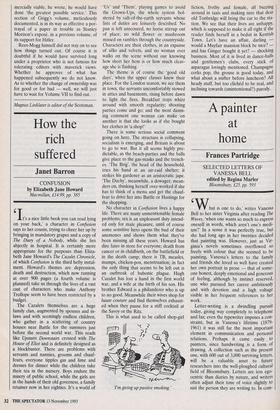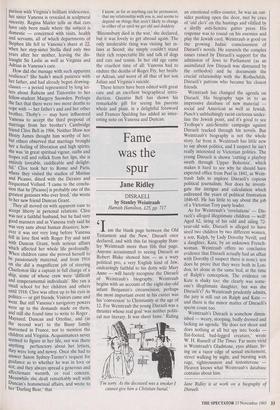A painter at home
Frances Partridge
SELECTED =ERS OF VANESSA BELL edited by Regina Marler Bloomsbury, 125, pp. 593 What is one to do,' writes Vanessa Bell to her sister Virginia after reading The Waves, 'when one wants so much to express oneself in words, which aren't one's medi- um?' In a sense it was perfectly true, but she had long ago in her twenties decided that painting was. However, just as Vir- ginia's novels sometimes overflowed so freely with colour that she seemed to be painting, Vanessa's letters to the family and friends she loved so well have created her own portrait in prose — that of some- one honest, deeply emotional and generous of feeling, although by instinct reserved, one who pursued her career ambitiously and with devotion and a high voltage visible in her frequent references to her work.
Letter-writing is a dwindling pursuit today, giving way completely to telephone and fax; even the typewriter imposes a con- straint, but in Vanessa's lifetime (1879- 1961) it was still far the most important element in communication and personal relations. Perhaps it came easily to painters, since handwriting is a form of drawing. A collection such as the present one, with 600 out of 3,000 surviving letters, will be a valuable asset to future researchers into the well-ploughed cultural field of Bloomsbury. Letters are less ego- centric than diaries by nature, and writers often adjust their tone of voice slightly to suit the person they are writing to. In corn- parison with Virginia's brilliant iridescence, her sister Vanessa is revealed in sculptural sincerity. Regina Marler tells us that cuts have only been made where the subject is domestic — concerned with visits, health and servants, all of which departments of Stephen life fell to Vanessa's share at 22, When her step-sister Stella died only two years after her mother, leaving the dis- traught Sir Leslie as well as Virginia and Adrian in Vanessa's care.
How did she manage with such apparent resilience? She hadn't much patience with her father, and had already begun drawing- classes — a period represented by long let- ters about Rubens and Tintoretto to her fellow-student Margery Snowden. Perhaps the fact that there were two more deaths to cope with — her father's and and her other brother, Thoby's — may have influenced Vanessa to accept the third proposal of marriage from her brother's Cambridge friend Clive Bell in 1906. Neither Shaw nor Henry James thought him worthy of her; but others observed that marriage brought her a feeling of liberation and high spirits; she was 'in great spiritual vigour, oaths and tropes roll and rollick from her lips, she is entirely loveable, cuddleable and delight- ful.' Clive took her to Rome and Paris, Where they visited the studios of Matisse and Picasso, dined with the Derains and frequented Vollard. 'I came to the conclu- sion that he [Picasso] is probably one of the greatest geniuses who ever lived,' she wrote to her new friend Duncan Grant.
They all moved on with apparent ease to accept liberty in personal relations. Clive was not a faithful husband, but he had very good manners and as Vanessa truly said he was very sane about human disasters; how- ever it was not very long before Vanessa fell in love first with Roger Fry and next With Duncan Grant, both serious affairs Which affected her whole life profoundly. When children came she proved herself to be passionately maternal, and from 1916 on she did a magnificent job of steering Charleston like a captain in full charge of a Ship, some of whose crew were 'difficult and temperamental individuals'. She ran a small school for her children and others until 1918; Clive was often up to his eyes in Politics — or girl friends. Visitors came and went. But still Vanessa's navigatory powers were up to the demands made on them, and still she found time to write to Roger, Maynard, Duncan and Ottoline, and (in the second war) to the Bussy family marooned in France, not to mention the Children and Virginia. Acquaintances never seemed to figure in her life, nor was there anything perfunctory about her letters, they were long and newsy. Once she had to answer Saxon Sydney-Turner's request for guidance as to whether he was in love or not; and they always spread a generous and affectionate warmth, or real concern. Meanwhile she dealt remarkably well with Duncan's homosexual affairs, and wrote to her 'Darling Bear,' that I know, as far as anything can be permanent, that my relationship with you is, and seems to depend on things that aren't likely to change in either of us until we get old and doddery.
'Bloomsbury died in the war,' she declared, but it was lovely to get abroad again. The only intolerable thing was visiting her in- laws at Seend; she simply couldn't stand their rich respectable life and talk of dogs and cats and tennis. In her old age came the cruellest time of all: Vanessa had to endure the deaths of Roger Fry, her broth- er Adrian, and worst of all that of her son Julian and Virginia's suicide.
These letters have been edited with great care and an excellent biographical intro- duction. Quentin Bell has shown his remarkable gift for seeing his parents whole and plain, in a delightful foreword and Frances Spalding has added an inter- esting note on Vanessa and Duncan.



























































 Previous page
Previous page